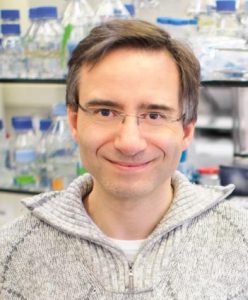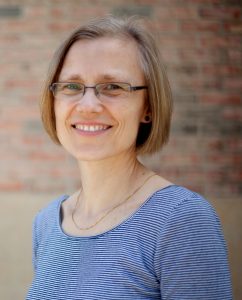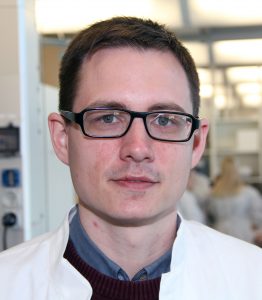Winners of the ISME/IWA biocluster award 2016 announced
In order to recognize the importance of interdisciplinary research at the interface of microbial ecology and water/wastewater treatment the IWA/ISME Bio Cluster has created the ISME/IWA Bio Cluster Award. This prestigious prize rewards interdisciplinary research of unusual merit in this field.
This award is biennially presented. All IWA or ISME members are entitled to nominate candidates. Candidates can be senior leaders in the field but can also be young rising stars. Nominated candidates must be members of either IWA or ISME (or both). After extensive review and discussions by world-leading experts in the field, three winners are chosen for this award:
 |
 |
 |
|
Grand Prize Prof. Holger Daims University of Vienna, Austria |
Grand Prize
Dr. Lut Raskin University of Michigan, USA |
Rising-Star Prize
Dr. Mads Albertsen Aalborg University, Denmark |
Meet the winners
Prof. Holger Daims became fascinated with the secrets of microbial life during his Master’s studies of microbiology, molecular biology and biotechnology at the University of Technology of the Rhineland (Aachen, Germany). This passion deepened during his Ph.D. research at the University of Technology Munich (Germany), which addressed the microbial ecology of nitrifying bacteria in wastewater treatment plants (WWTPs). After his dissertation in 2001 and a postdoc period in Munich and a research stay at the University of Queensland (Australia), Holger moved in 2003 to Vienna (Austria) to become Assistant Professor and a founding member of the new Department of Microbiology and Ecosystem Science (headed by Michael Wagner) at the University of Vienna. With third-party funds he built up his research group, whose work focuses on the biology of nitrite-oxidizing bacteria (NOB).
At present, Holger is Associate Professor at the University of Vienna. Early in his career he developed probes for rRNA-targeted FISH and digital image analysis software for quantitative FISH, which have been used in hundreds of studies on wastewater microbiology by researchers around the world. Highlights of his work include the physiological and the first genomic characterization of Nitrospira, which are the mostly uncultured key NOB in WWTPs and critical for successful nitrogen removal from wastewater. Holger’s group discovered an unexpected metabolic flexibility of Nitrospira, such as growth on hydrogen (H2) and a novel ‘reciprocal feeding’ interaction with ammonia oxidizers where the NOB actually start nitrification. Holger and his team also made key contributions to the recent, surprising discovery of complete ammonia oxidizers (‘comammox’), which are Nitrospira members that catalyze full nitrification in a single organism and can be the predominant nitrifiers in WWTPs and drinking water treatment systems. Other milestones of his work include the finding that many NOB possess highly active chlorite dismutase (an enzyme that detoxifies chlorite from chlorate reduction), the characterization of novel NOB (Nitrolancea, Nitrotoga) in WWTPs, and the identification of a bacterial predator that attacks Nitrospira in activated sludge.
Altogether, Holger’s work has dramatically changed our picture of nitrification and nitrifying microbial communities in engineered systems, with strong implications for future fundamental and applied research on these topics.
Dr. Lut Raskin, the Altarum/ERIM Russell O’Neal Professor of Environmental Engineering at the University of Michigan, is a pioneer and internationally recognized scholar in molecular microbial ecology applied to water quality control. Most of her research focuses on various aspects of the engineered water cycle microbiome. Her laboratory especially focuses on drinking water systems including biofiltration, disinfection, distribution, and premise plumbing, and water and energy recovery from waste streams. She has published 125 peer-reviewed journal papers and over 300 conference proceedings papers and abstracts.
Dr. Raskin has served as the research advisor and mentor of approximately 60 graduate students, including 20 Ph.D. students, and 12 postdocs. She has maintained a high level of professional service through several societies focusing on both microbiology and engineering. For example, she has been active in organizing sessions and workshops at IWA Conferences (Leading Edge Conference on Water and Wastewater Technologies [LET] and conferences organized by Anaerobic Digestion [AD], Micorbial Ecology and Water Engineering [MEWE], and Biofilms specialist groups), has served on Scientific Committees for these conferences, and co-organized MEWE 2013. She is a member of the IWA AD Specialist Group Leadership Committee. She serves as an Associate Editor of Environmental Science & Technology and is a member of the Editorial Board of five other journals. Dr. Raskin is an elected Fellow of the American Academy of Microbiology and the Water Environment Federation.
She received the 2007 Association of Environmental Engineering and Science Professors (AEESP) Frontier Award in Research, the 2006 American Society of Civil Engineers Walter L. Huber Civil Engineering Research Prize, the 2002 Paul L. Busch Award (Water Environment Research Foundation Endowment for Innovation in Applied Water Quality Research), and a 1997 National Science Foundation CAREER Award.
Dr. Mads Albertsen is currently a Post Doc at Center for Microbial Communities (CMC), Aalborg University, Denmark in the group of prof. Per H. Nielsen. He received his PhD on “Ecosystem Models in Biological Phosphorus Removal”, at the same place with a research stay at the University of Queensland in the group of prof. Philip Hugenholtz.
The research of Mads Albertsen is at the interface of method development related to DNA sequencing and microbial ecology of engineered environments such as wastewater treatment systems. At the age of thirty, he is an international recognized expert in the field of metagenomics and has contributed to the development of novel approaches to retrieve complete genomes from metagenomes.
Throughout his carrier, Mads Albertsen and colleagues from CMC have used genome-centric metagenomics to unravel the functional potential of key organisms in many environments. A focus point has been organisms related to enhanced biological phosphorus removal. The information obtained is integrated in the MiDAS framework, which attempts to standardize methods used in wastewater related ecosystems.
In 2014 Mads Albertsen also co-founded the company DNASense ApS, which enable industrial partners to take advantage of the new possibilities in DNA sequencing.
Award Ceremony and presentations from the winners
The winners will be awarded during the next ISME Congress: 16th International Symposium on Microbial Ecology that will take place in Montreal, Canada on 21-26 August 2016, and they will also be invited to give a talk during the IWA World Water Congress & Exhibition to be held in Brisbane, 9-14 October 2016.

